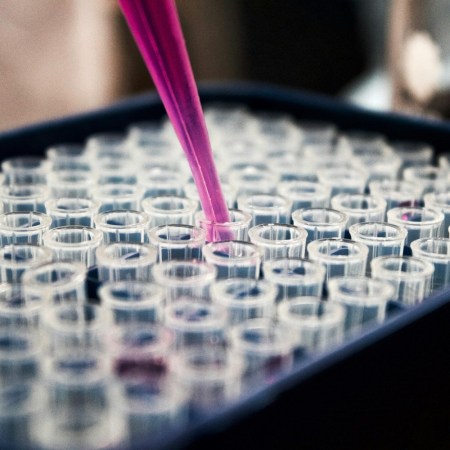As an unmarried 29-year-old living in New York, I am unequivocally certain that I am not ready to have kids. And barring any Jerry Maguire-esque middle-of-the-night epiphanies, I don’t plan to be ready for quite some time. The rest of America is of a similar mind: the average age of parents has been steadily increasing for decades.
But if and when the time finally arrives, I don’t want my body to make the decision for me. Meaning: if my boys aren’t good swimmers, I’d like to know about that now. And I’d also like to know of any habits or vices having an adverse effect on that status.
Most gents don’t like to talk about this. We’ve been trained to believe that performance issues somehow make us less of a man. This couldn’t be further from the truth: accepting accountability for your health and doing everything you can to optimize it is the mark of a mature, self-sufficient adult.
So we decided to ring up fertility expert Maria Sophocles, MD, an Ob/Gyn and Sexual Medicine expert at Women’s Healthcare of Princeton, to learn some best practices for maintaining male fertility well into the future. No matter what stage you’re at in the child-having process, these are good things to know.
According to Dr. Sophocles, fertility is very much correlated to overall health. Meaning, the better you take care of yourself, the more likely you are to have healthy sperm.
But what exactly does “having healthy sperm” mean? As the good doctor puts it, “We’re looking for properly shaped, straight swimmers. You make millions of them and the vast majority of them are going to be deformed or poor swimmers, but you only need a few. We measure them by healthy sperm percentage per milliliter — the ‘target’ percentage varies from clinic to clinic, and I don’t want you to read this and then go to a different clinic with a different number and be worried by the discrepancy. Luckily, nowadays (thanks to technology) we’re able to take a B- sample and easily turn it into an A.” Think of this process as filtering out the less fit sperm to create a pool of strong, straight-swimming sperm.
It’s important to keep in mind that these are general guidelines and every individual is different. Some men can treat their bodies destructively and remain fertile; others can take every precaution in the world and still be infertile. So consider these recommendations — not rules — for ensuring you’re doing your part to uphold your family line (if that’s what you want, of course).
Clothing
All I could think about going in to this interview was that episode of Seinfeld where Kramer had to “get off Jockey shorts” because it was lowering his sperm count. Could that actually be true? Short answer: Sort of. Longer answer from Doctor Sophocles: “It’s all about heat. Too tight clothing for prolonged periods of time can result in a decrease in fertility. It’s due to temperature. Tighter underwear/pants mean the testicles are closer to the body which means they are warmer. That’s not to say don’t wear form-fitting things; it just means be aware and take breaks (like sleeping naked or in something loose fitting).”
Food and drink
As mentioned before, fertility is often correlated with overall health, so the better you’re eating, the better off you’ll be. But Dr. Sophocles has a few additional points: “Things like fish are great because they’re high in Coenzyme Q10 which is great for increased fertility. Zinc is also great. All of the natural antioxidants occurring in fruits, vegetables and nuts are always great as well.” As far as what’s not great for you? “Processed foods are never great, as well as foods that are cultivated with pesticides.”
Vices
Drugs, alcohol and tobacco are obviously not good for our bodies in general, and the same goes for our sperm. “The heavier of a user you are, the worse off you’re going to be. Obviously there are exceptions. And it should be looked at as more of a correlation to healthiness. If you do these things in moderation, you’ll generally be OK, same with your sperm.”
Medication and supplements
Any prescription medication you’re taking is probably for good reason, so consult with your doctor on whether or not that medication has an adverse effect on sperm count. But I was also curious about over-the-counter meds like Advil or Tylenol. According to Doctor Sophocles, “Yes, they can have an effect, but that doesn’t mean you should avoid them if you have a headache. They may cause issues, but only if you are taking them super frequently.”
And as for supplements meant to increase fertility: “There isn’t a whole lot of oversight in terms of claims of how effective they are, so enter everything as a skeptic and chat with an actual doctor about it.”
Electronics
For better or worse, we’re constantly using them, and that’s not going to change any time soon. So are they bad for fertility? “Yes, especially the laptop. But that’s once again a heat issue. If you’re consistently working with your laptop on your lap for extended periods, it can cause issues.” Luckily that’s an easily solvable problem — just get yourself a lap desk for lounging at home on the couch or in bed. I use a cardboard box from a clothing order and it works great.
Stress
According to Dr. Sophocles: “It can cause a decrease in the quality of sperm both in the short term (if you had a rough week), and more importantly, if you’ve had a particularly trying period of your life — that can cause more lasting effects. So it’s important to be aware of that and see mental health professionals when necessary.”
Exercise
I was under the impression that biking might be bad for fertility, but it doesn’t really seem to be an issue. Just about any exercise you can do is going to help you in the long run. The one exception seems to be extreme athletes who train upwards of six hours a day.
Other odds and ends
Dr. Sophocles actually called me back to let me know she forgot this on the initial call, so it must be important! “Some lubricants are actually spermicidal and couples don’t realize it. So make sure you’re using the right kind of lube. The least damaging lube on the market is called Pre-Seed. It’s marketed towards couples trying to conceive.”
If you’re a sauna or hot tub enthusiast (meaning you’re going for extended periods every day) you may want to lay off them. In Scandinavia, where bathing culture is a major part of everyday life, male-fertility issues are common.
On how often you should get checked …
I was also curious as to when and how often men should see their doctor for an official roll call. Dr. Sophocles gave me a surprising answer: “There’s no need to get checked just for the sake of getting checked — it’s too expensive. You should really only see a fertility specialist if you’ve been trying to get pregnant and there are problems. Once you speak with a specialist, they can identify some habitual things you’re doing that may be causing issues: smoking too much, working with your laptop on your lap, nightly visits to the jacuzzi. They’ll have you cut out that habit and come back in a month or so for another test. For a lot of these issues, sperm health can improve things that quickly, because guys are producing it that quickly.”
And as for the optimal number of times a gent should be ejaculating each week: “If you’re really trying for a child and know that, say, a set of three days is when fertility is highest for the woman, you should probably save up for a few days before that fertile window opens. The more semen, the more sperm. Look, you wouldn’t want to go into a Michelin restaurant after you’ve been snacking all day, right?”
In conclusion
Fertility should be looked at as an extension of your overall health. Most things you’re doing that aren’t great for you aren’t going to be good for your sperm count, and vice versa. Luckily for guys, we’re constantly producing it, so negative habits can be quickly corrected, generally to positive effect. There’s no one thing that will ruin your fertility forever save a catastrophic injury or vasectomy (and even that one is reversible!). But there’s also no one thing that will instantly make you more fertile, so take care of your body in the meantime — you only get one of them.
The Charge will help you move better, think clearer and stay in the game longer. Subscribe to our wellness newsletter today.























